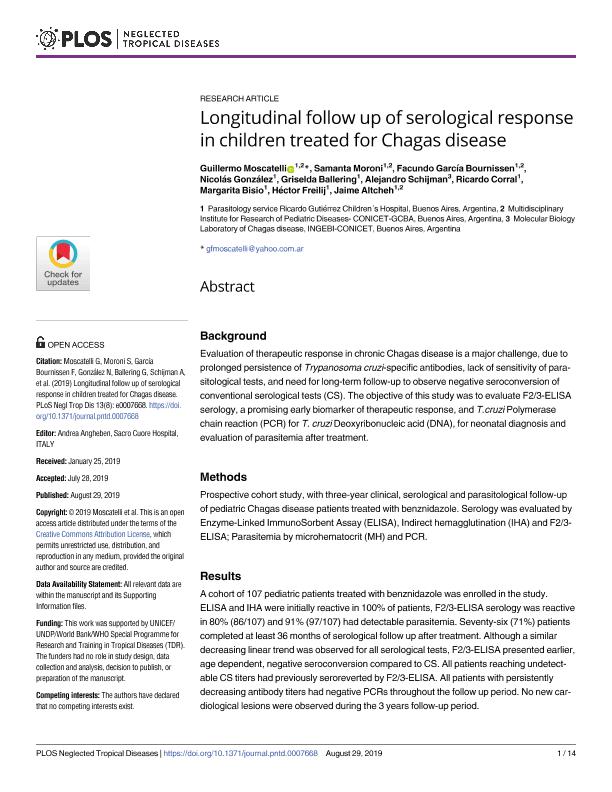Artículo
Longitudinal follow up of serological response in children treated for Chagas disease
Moscatelli, Guillermo ; Moroni, Samanta; García Bournissen, Facundo
; Moroni, Samanta; García Bournissen, Facundo ; González, Nicolás; Ballering, Griselda; Schijman, Alejandro Gabriel
; González, Nicolás; Ballering, Griselda; Schijman, Alejandro Gabriel ; Corral, Ricardo Santiago
; Corral, Ricardo Santiago ; Bisio, Margarita; Freilij, Héctor; Altcheh, Jaime Marcelo
; Bisio, Margarita; Freilij, Héctor; Altcheh, Jaime Marcelo
 ; Moroni, Samanta; García Bournissen, Facundo
; Moroni, Samanta; García Bournissen, Facundo ; González, Nicolás; Ballering, Griselda; Schijman, Alejandro Gabriel
; González, Nicolás; Ballering, Griselda; Schijman, Alejandro Gabriel ; Corral, Ricardo Santiago
; Corral, Ricardo Santiago ; Bisio, Margarita; Freilij, Héctor; Altcheh, Jaime Marcelo
; Bisio, Margarita; Freilij, Héctor; Altcheh, Jaime Marcelo
Fecha de publicación:
08/2019
Editorial:
Public Library of Science
Revista:
Neglected Tropical Diseases
ISSN:
1935-2735
Idioma:
Inglés
Tipo de recurso:
Artículo publicado
Clasificación temática:
Resumen
BACKGROUND: Evaluation of therapeutic response in chronic Chagas disease is a major challenge, due to prolonged persistence of Trypanosoma cruzi-specific antibodies, lack of sensitivity of parasitological tests, and need for long-term follow-up to observe negative seroconversion of conventional serological tests (CS). The objective of this study was to evaluate F2/3-ELISA serology, a promising early biomarker of therapeutic response, and T.cruzi Polymerase chain reaction (PCR) for T. cruzi Deoxyribonucleic acid (DNA), for neonatal diagnosis and evaluation of parasitemia after treatment. METHODS: Prospective cohort study, with three-year clinical, serological and parasitological follow-up of pediatric Chagas disease patients treated with benznidazole. Serology was evaluated by Enzyme-Linked ImmunoSorbent Assay (ELISA), Indirect hemagglutination (IHA) and F2/3-ELISA; Parasitemia by microhematocrit (MH) and PCR. RESULTS: A cohort of 107 pediatric patients treated with benznidazole was enrolled in the study. ELISA and IHA were initially reactive in 100% of patients, F2/3-ELISA serology was reactive in 80% (86/107) and 91% (97/107) had detectable parasitemia. Seventy-six (71%) patients completed at least 36 months of serological follow up after treatment. Although a similar decreasing linear trend was observed for all serological tests, F2/3-ELISA presented earlier, age dependent, negative seroconversion compared to CS. All patients reaching undetectable CS titers had previously seroreverted by F2/3-ELISA. All patients with persistently decreasing antibody titers had negative PCRs throughout the follow up period. No new cardiological lesions were observed during the 3 years follow-up period. CONCLUSIONS: The data reported here, using CS, F2/3 ELISA and PCR provide support for the efficacy of benznidazole in congenital Chagas diseases. These results provide support for scaling up of screening, diagnosis and access to benznidazole treatment.
Palabras clave:
Chagas
,
treatment
,
PCR
,
Biomarkers
Archivos asociados
Licencia
Identificadores
Colecciones
Articulos(IMIPP)
Articulos de INSTITUTO MULTIDISCIPLINARIO DE INVESTIGACIONES EN PATOLOGIAS PEDIATRICAS
Articulos de INSTITUTO MULTIDISCIPLINARIO DE INVESTIGACIONES EN PATOLOGIAS PEDIATRICAS
Articulos(INGEBI)
Articulos de INST.DE INVEST.EN ING.GENETICA Y BIOL.MOLECULAR "DR. HECTOR N TORRES"
Articulos de INST.DE INVEST.EN ING.GENETICA Y BIOL.MOLECULAR "DR. HECTOR N TORRES"
Citación
Moscatelli, Guillermo; Moroni, Samanta; García Bournissen, Facundo; González, Nicolás; Ballering, Griselda; et al.; Longitudinal follow up of serological response in children treated for Chagas disease; Public Library of Science; Neglected Tropical Diseases; 13; 8; 8-2019; 1-14
Compartir
Altmétricas



